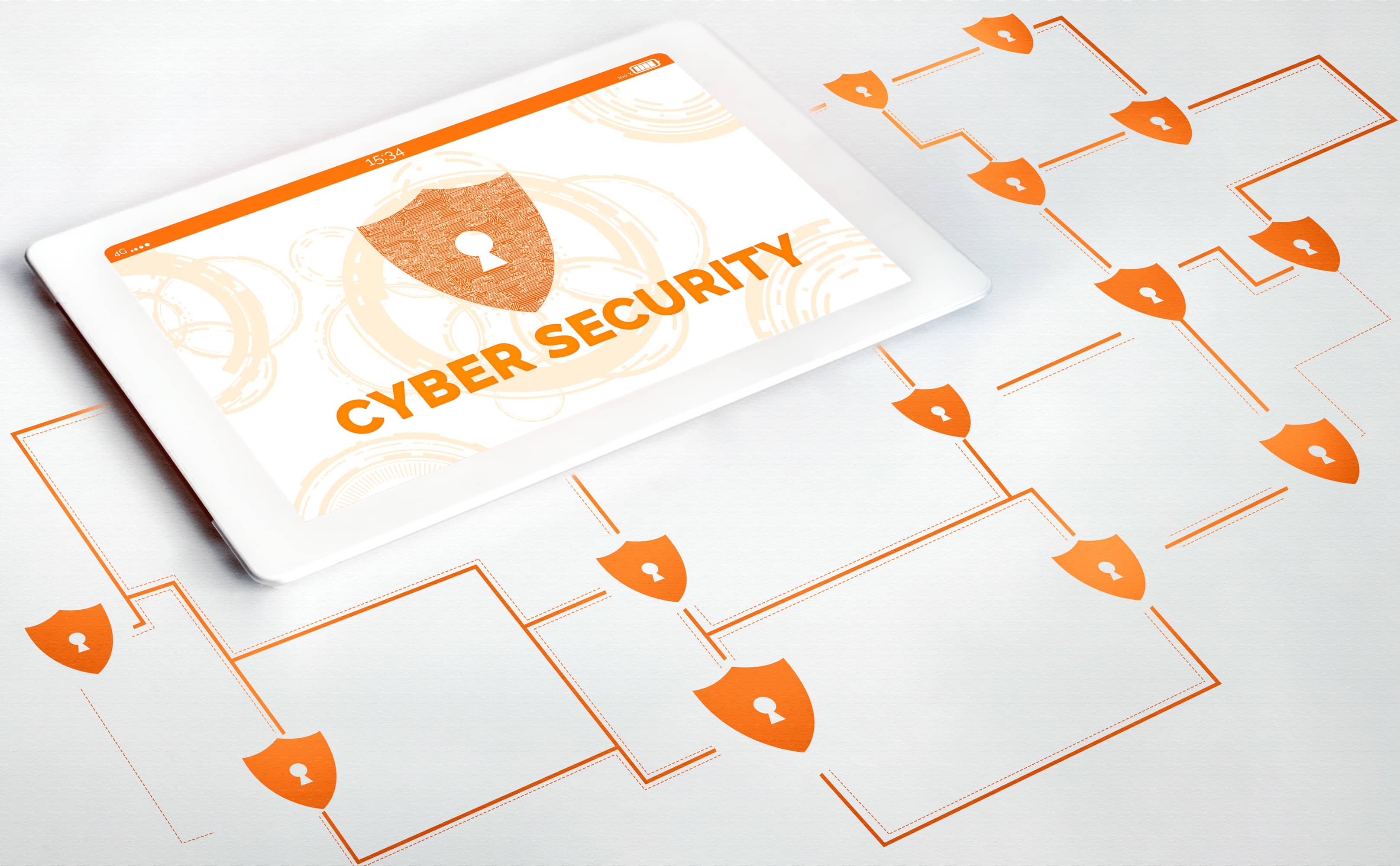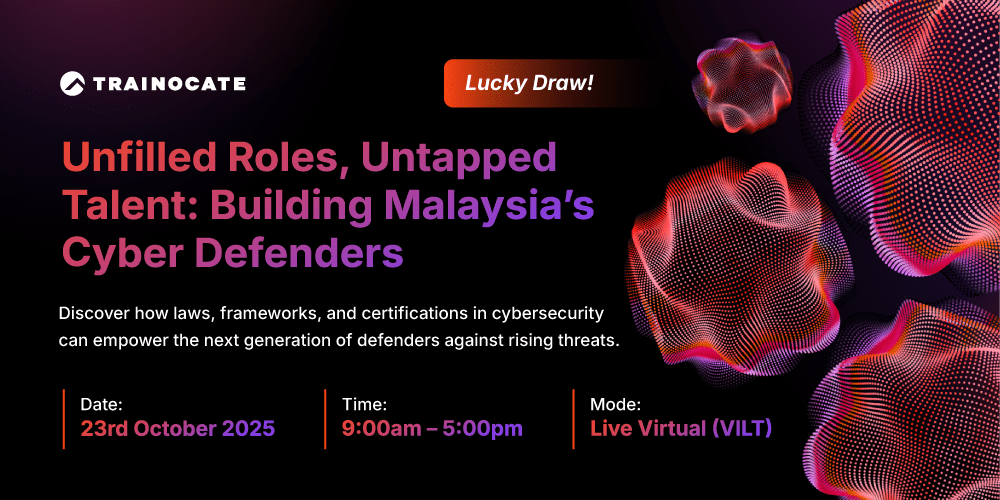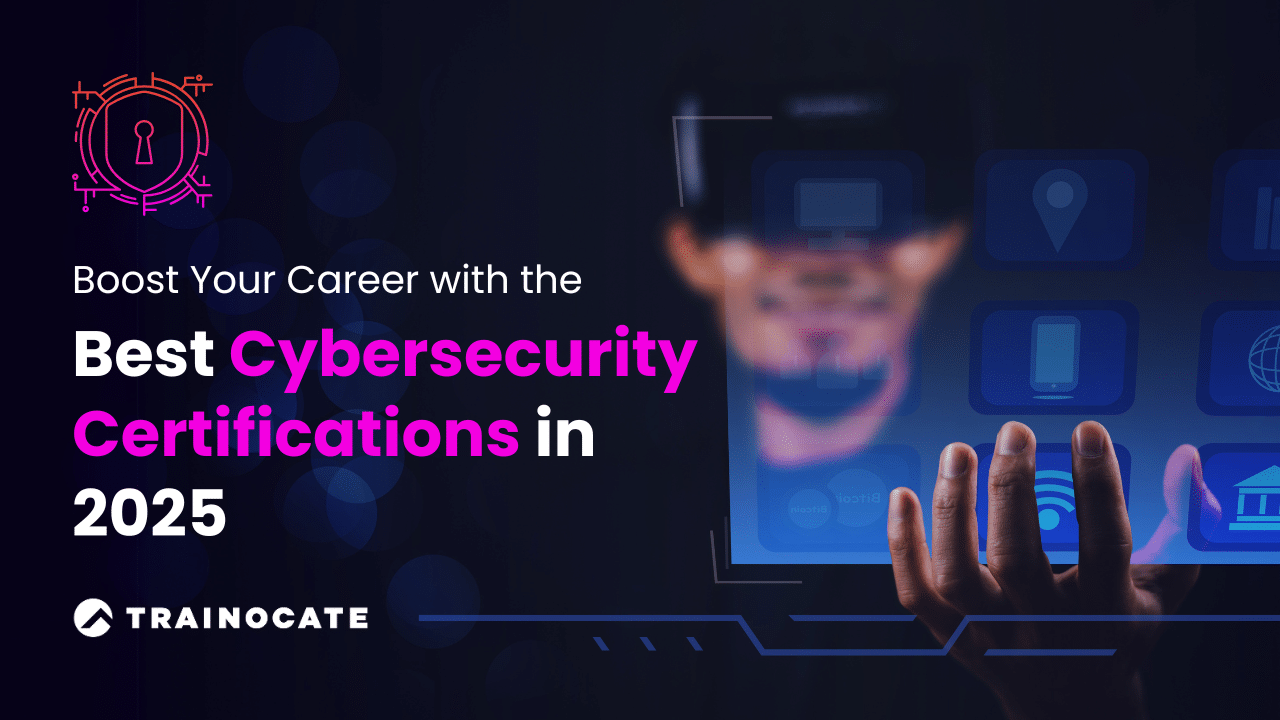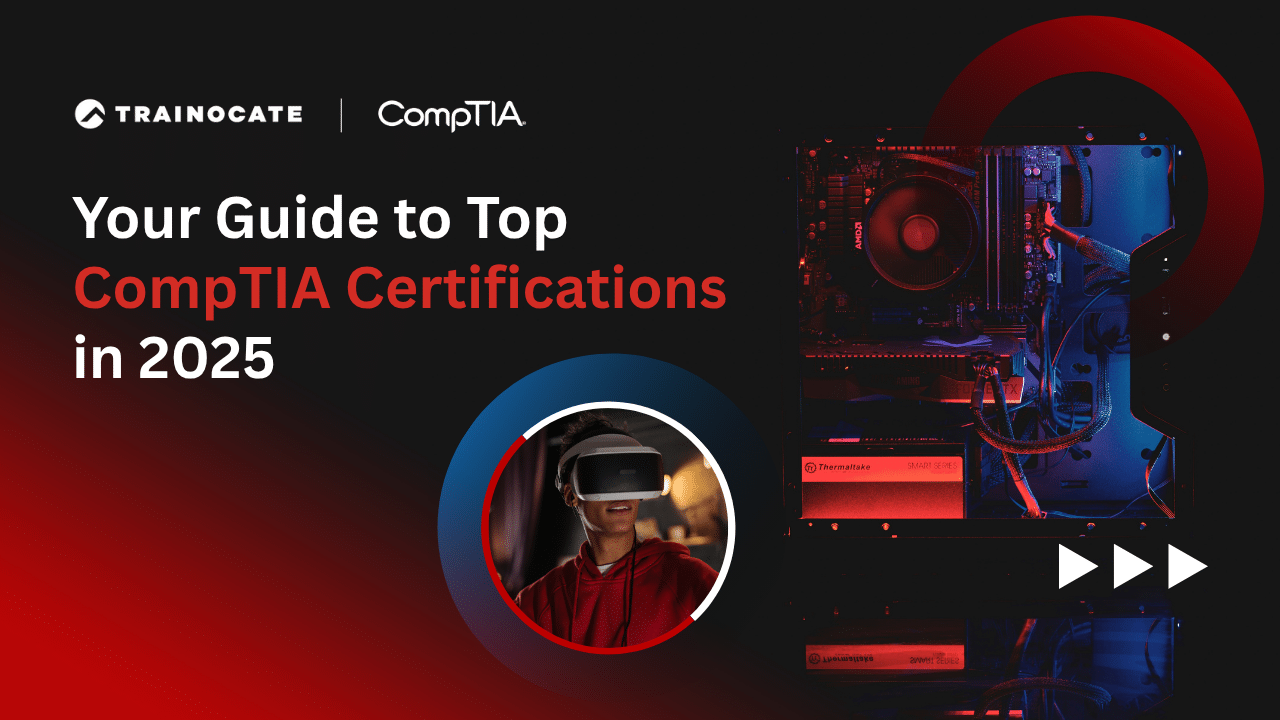Your Guide to Cybersecurity Training and Certifications in 2025
Your Guide to Cybersecurity Training and Certifications in 2025

How do you choose the right
Cybersecurity Training & Certifications in 2025?
Selecting the right cybersecurity training and certification is crucial in 2025 for anyone aiming to bolster their cybersecurity skills or career path.
This guide tackles the vital questions: Which certifications are currently valued in the industry? How do they translate into real-world skills and job opportunities? Get the facts and strategic insights you need to make informed decisions in today’s evolving cybersecurity landscape, without any fuss.
Navigating the
Cybersecurity Certification Landscape
Checkpoint reports that global cyber attacks surged in the first quarter of 2025, with organizations experiencing an average of 1,925 attacks per week. This marks a 47% increase from the previous quarter of 2024. Furthermore, the education sector saw the highest number of attacks, with 4,484 weekly, followed by government and telecommunications with 2,678 and 2,664 attacks, respectively.
Major Cyber Threats and Incidents in Malaysia 2024
- Scam calls in Malaysia skyrocketed by 82.81% in 2024 according to the 2024 Whoscall Annual Report.
- Kaspersky reports a 153% rise in ransomware attacks on Malaysian businesses in 2024.
- Malaysian political figures and government officials targeted by Babylon RAT which is an open-source Remote Access Trojan (RAT) designed to provide unauthorized access to the victim’s machine.
- Businesses and organizations in Malaysia are among the top in Southeast Asia facing web-based threats, with 19.62 million attacks in the first half of the year of 2024 (1H 2O24), according to cybersecurity company, Kaspersky.
To tackle the myriad of cybersecurity challenges in Malaysia, a professional cybersecurity certification is super important as it serve as a testament to your proficiency. Not only it would testify to a professional’s expertise, but also making them more appealing in the job market.

Certifications such as ISC2 CISSP, ISACA CISA, as well as CompTIA Security+ are some of the most sought-after cybersecurity certifications, more about our recommended cybersecurity certifications later. Indeed, in 2025, cybersecurity consultants are actively seeking certifications to validate their expertise and stay up-to-date with the latest security practices and technologies.
Hence, regardless of whether you’re a novice or a veteran in the cybersecurity field, securing the appropriate certifications is pivotal for career progression.
Decoding Job Market Needs
According to a New Straits Times news report, Prime Minister Datuk Seri Anwar Ibrahim has stated that Malaysia’s goal of having 25,000 cyber defenders by 2025 faces a shortage of 12,000 cybersecurity professionals.
Understanding the cybersecurity job market’s needs is a critical first step towards choosing the right certification path. By analyzing job postings on platforms like Indeed and LinkedIn, professionals can accurately identify the cybersecurity certifications that employers are actively seeking. This analysis categorizes common certification requests from recent job postings, pinpointing which certifications are favored by employers.
Therefore, demystifying job market demands can offer essential insights into the skills required to bridge the cybersecurity workforce gap, steering professionals towards the acquisition of these future job-ready skills.
Building a
Foundation in Cybersecurity
Building a robust foundation in cybersecurity requires a comprehensive understanding of networking as well as system administration. These skills are essential for tasks such as configuring and maintaining networks, apps and servers, which underpin cybersecurity. In addition, foundational cybersecurity certification courses, such as those testing networking and security proficiency, form the bedrock of a well-rounded skill set for entering the field.
This robust foundation in cybersecurity enables professionals to safeguard networks, thwart cyber attacks, and react efficiently when security incidents transpire.

It forms the stepping stone to advance to specialized cybersecurity roles, such as ethical hacking to governance, risk and compliance (GRC). By honing these fundamental skills and securing pertinent certifications, professionals can prepare themselves to traverse the progressively intricate world of cybersecurity.
The Evergreen Skills of Cybersecurity
In the ever-evolving field of cybersecurity, certain skills remain timeless. Some of these skills include:
- Proficiency in operating systems like Windows, Linux, and Mac OS
- Knowledge of network security controls
- Familiarity with control frameworks and standards such as NIST, ISO, CIS, and SOC
These skills are vital for any professional in the cybersecurity field and help them implement robust security measures.
In addition, understanding and applying cryptography is becoming increasingly critical in protecting information and maintaining secure networks. Furthermore, newer cybersecurity trends like AI security and zero-trust network security are reinforcing the importance of these evergreen skills. By excelling in these skills, cybersecurity professionals can ascertain their readiness to handle a broad spectrum of cyber threats, irrespective of the dynamic landscape.
Foundational Cybersecurity Certifications to Consider
Building a strong foundation in cybersecurity requires not only theoretical knowledge but also practical skills that can be applied across various platforms and technologies. Here are some foundational certifications that align with this philosophy:
→ Microsoft Security, Compliance and Identity Fundamentals
- This 1-day course offers a comprehensive understanding of security, compliance, and identity across Microsoft’s cloud-based services.
- Gain essential skills in basic security concepts, Microsoft identity and access management solutions, and Microsoft security solutions.
- Crucial for professionals familiarizing themselves with fundamental cybersecurity principles and technologies.
- Prepares learners for the Microsoft Certified: Security, Compliance, and Identity Fundamentals certification
- A stepping stone to roles such as Security Operations Analyst, Identity and Access Administrator, Information Security Administrator, Cybersecurity Architect
→ CC: ISC2 Certified in Cybersecurity
- The entry-level credential for tomorrow’s cybersecurity leaders
- Gives you the knowledge and skills you need to begin your first role ready for what’s next.
- Breaks down traditional barriers to entry, enabling you to build confidence and enter your first cybersecurity role ready for what’s next.
- Prepares learners for entry-level cybersecurity job roles such as Security Analyst, Security Specialist, Security Architect, Security Auditor, Forensic Specialist/Analyst.
- Won the 2023 SC Award for the Best Professional Certification Program in the EU/UK and USA.
- This 5-day course targets individuals responsible for securing network services, devices, and traffic within organizations.
- Covering information security fundamentals, risk analysis, threat identification, and security implementation, participants acquire skills in security assessments, implementing measures, and addressing various threats.
- CompTIA Security+ certification is widely recognized in the cybersecurity field.
- Read: Is CompTIA Security+ Worth it in 2024?
→ CBROPS: Understanding Cisco Cybersecurity Operations Fundamentals v1.0
- Essential for cybersecurity professionals, this course teaches security concepts, network and application operations, and incident investigation techniques.
- Learn about vulnerabilities, attack methodologies, and defense technologies to better protect organizations against cyber threats and mitigate risks effectively.
- Prepares learners for the Cisco Certified Cybersecurity Associate certification
- Perfect for roles such as Network Security Engineer, Security Operations Center (SOC) Analyst, IT Security Operations Specialist
→ CCOA: ISACA Certified Cybersecurity Operations Analyst
- Focuses on the technical skills to evaluate threats, identify vulnerabilities, and recommend countermeasures to prevent cyber incidents
- The certification covers 5 globally validated domains: Technology Essentials, Cybersecurity Principles and Risks, Adversarial Tactics, Techniques, and Procedures, Incident Detection and Response, Securing Assets
- Specifically addresses the needs of individuals with 2-3 years of experience, filling a gap in the market between entry-level and intermediate certifications, using globally validated domains.
- Prepares learners for roles such as Cybersecurity Analyst, Information Security Analyst, SOC Analyst, Vulnerability Analyst, Incident Response Analyst, Tier 1 and 2 SOC Support
→ SAW1: Security Awareness Workshop Level 1
- This 0.5-day workshop provides intensive security awareness training, emphasizing IT systems security, threat monitoring, and cyberattack understanding.
- Suitable for all technical levels, participants learn security fundamentals, recent attack methodologies, social media risks, and password security best practices.
- Essential for anyone using technology, regardless of technical background.
→ AWS-SE: AWS Security Essentials
- Covering fundamental AWS cloud security skills & concepts, this course prepares participants to secure their AWS infrastructure effectively.
- Learn AWS access control, data encryption methods, incident response, and compliance with industry best practices.
- Gain skills in mitigating security risks and ensuring the security of AWS resources.
- A stepping stone to roles such as Security engineers, Security architects, Cloud Architects, Cloud operators
- Prepares learners for the AWS Certified Security – Specialty certification.
- The AWS Certified Security – Specialty is also the top highest-paying technical certifications in the United States, according to October 2024 findings from Skillsoft’s annual IT Skills and Salary survey
→ ECSS: EC-Council Certified Security Specialist
- The EC-Council Certified Security Specialist (ECSS) certification equips students with fundamental skills in information security, network security, and computer forensics.
- This entry-level certification covers key concepts such as threats, protocols, social engineering, hacking cycles, cryptography, firewalls, and incident handling.
- Ideal for those beginning their careers in information security and enhances your skills as a Security Specialist and increases your employability
- Prepares learners for future cybersecurity roles related to Network Defense, Ethical Hacking, Pentesting, Security Ops, Cloud Security
→ RCCS: Rocheston Certified Cybersecurity Specialist
- The Rocheston Certified Cybersecurity Specialist (RCSS) certification is globally recognized for excellence in cybersecurity.
- This program covers incident response, risk management, security architecture, and forensics, providing skills to identify, assess, and mitigate cyber risks.
- Suitable for individuals aiming to become cybersecurity specialists, the RCSS curriculum is practical and aligned with industry standards.
By completing these foundational certifications, cybersecurity professionals can build a solid understanding of core concepts, technologies, and best practices, laying the groundwork for a successful career in cybersecurity.
Advancing
Your Career with Specialized Cybersecurity Certifications
Once a strong foundation is established, professionals can further advance their careers by specializing in niche areas. Some examples of specialized certifications that can be beneficial include:
- Certifications that focus on specific programming languages
- Certifications that address broader cybersecurity concepts
- Risk assessment certifications, which help with fulfilling compliance and equips professionals with skills that translate across different cybersecurity roles

The decision to specialize should align with individual career aspirations and current cybersecurity market trends. By securing specialized certifications, professionals can augment their expertise, attain a competitive edge, and unlock opportunities for higher remuneration and advanced roles.
Aligning Certifications with Career Progression
Aligning certifications with career progression is a strategic move for any cybersecurity professional. This involves choosing certifications that reflect their current experience level and support their desired career progression.
Some factors to consider when choosing certifications include:
By carefully considering these factors, cybersecurity professionals can make informed decisions about which certifications to pursue to advance their careers.
The Balance Between
Vendor-Specific & Vendor-Neutral Certifications
Choosing between vendor-specific and vendor-neutral certifications is a crucial decision for cybersecurity professionals. Vendor-specific certifications specialize in confirming expertise in certain information security tools from specific vendors.
In contrast, vendor-neutral certifications showcase broad compatibility across diverse technologies and products. Cybersecurity certifications such as CompTIA, ISACA and ISC2 serve as a prime example of such vendor-neutral certifications.

Vendor-specific certifications are essential for professionals aiming to work with organizations that use a particular vendor’s solutions, as these certifications establish proven proficiency in those specific tools and technologies.
On the other hand, vendor-neutral certifications are valued across a multitude of organizations due to their focus on universal cybersecurity skills and concepts that aren’t confined to the products of a single vendor. While vendor-specific certifications can lead to a depth of knowledge in certain products, they could also foster a dependency on those technologies, limiting an individual’s adaptability to different security solutions.
Consequently, striking a balance between vendor-specific and vendor-neutral certifications is vital for professionals aiming to adapt to diverse security solutions and meet various organizational needs.
Choosing the Right Training Partner
When it comes to investing in training and development, selecting the right partner is paramount. Opting for an official training partner like Trainocate Malaysia offers several advantages:
Cybersecurity Roles and Certifications:
A Matchmaking Guide
Matching the right certifications with the appropriate cybersecurity roles can significantly impact career advancement.
By comprehending the link between cybersecurity roles and certifications, professionals can make enlightened decisions regarding their career advancement.

Whether it’s an aspiring cybersecurity analyst or an experienced professional aiming for leadership positions, the right certification can open doors to new opportunities and accelerate career growth.
Certifications for General Cybersecurity & Leadership
Cybersecurity leadership isn’t solely about technical prowess; it requires a blend of technical acumen and strategic vision. Aspiring leaders in this field should not only hone their technical skills but also invest in certifications that validate their leadership potential.
When considering certifications for cybersecurity leadership, ISACA cybersecurity certifications stand out. ISACA provides a pathway for professionals to elevate their careers through specialized certifications.
→ Certified Information Systems Auditor (CISA)
- The CISA certification from ISACA is for IT professionals auditing, monitoring, and assessing information technology and business systems.
- With five key domains and at least five years of relevant experience, CISAs ensure compliance and minimize risks.
- Recognized globally, CISA holders advance to senior roles like IT auditor or chief information security officer.
→ Certified Information Security Manager (CISM)
- The CISM certification, also from ISACA, targets advanced IT security managers.
- Focusing on high-level IT security management, it enhances the perception of IT security teams and demands a deep understanding of business.
- With four key areas of focus, CISM holders communicate vulnerabilities effectively and balance priorities.
→ Certified in Risk and Information Systems Control (CRISC)
- CRISC, another ISACA certification, empowers IT professionals to become risk management champions.
- With over 40,000 holders globally, CRISC validates skills in identifying, assessing, and mitigating IT-related risks.
- It emphasizes strategic thinking to proactively address potential issues, positioning holders as trusted advisors within their organizations.
→ Certified in the Governance of Enterprise IT (CGEIT)
- The CGEIT certification, also from ISACA, sets IT governance professionals apart. Focusing on assessing, designing, and managing IT governance systems aligned with organizational goals, CGEIT maximizes business value through effective governance.
- With five key areas of focus, CGEIT holders lead strategic decision-making within the IT governance landscape.
Among these, certifications like CISM and CRISC are particularly valuable for those eyeing management roles.
Understanding the nuances of each certification is paramount for individuals weighing their options between CISM and CRISC. While CISM focuses on information security management, CRISC delves deeper into risk assessment and mitigation strategies. Choosing the right certification depends on one’s career goals and areas of expertise.
Incorporating ISACA certifications into corporate training programs is a strategic move for organizations looking to cultivate a cybersecurity-conscious workforce. By aligning training initiatives with ISACA’s renowned certifications, businesses can ensure that their employees are equipped with the latest skills and knowledge to tackle evolving cybersecurity challenges effectively.
Certifications for Aspiring Cybersecurity Analysts
Aspiring cybersecurity analysts have a range of certifications to choose from. Technical skills essential for this role include knowledge of operating systems, network security control, intrusion detection, incident response, cloud security, regulatory guidelines, scripting, threat knowledge, and familiarity with control frameworks.
In an increasingly digital world, the role of a cybersecurity analyst is more important than ever. By chasing the apt certifications, budding cybersecurity analysts can gain the requisite technical competencies for a triumphant career in cybersecurity.
→ CompTIA Cybersecurity Analyst
- Covering the duties of cybersecurity analysts, this 5-day course focuses on monitoring, detecting, and responding to security incidents in information systems and networks.
- Gain skills in assessing security risks, analyzing threats, identifying attacks, and responding effectively.
- This certification equips professionals with essential skills for cybersecurity threat identification and response.
→ Microsoft Information Security Administrator
- In this comprehensive 2-day course, learn to protect information in Microsoft 365 deployments through data governance and information protection.
- Topics include implementing data loss prevention policies, using sensitivity labels, securing messages in Office 365, and defining information governance configurations.
- Gain skills in data protection and governance using Microsoft technologies, vital for safeguarding sensitive information.
- Prepares learners for the Microsoft Certified: Information Security Administrator Associate certification
→ ECSA: EC-Council Certified Security Analyst
- The ECSA certification is a unique security credential offering hands-on penetration testing experience.
- It covers testing of modern infrastructures, operating systems, and applications, and teaches students how to document and write penetration testing reports.
- Building on skills from the Certified Ethical Hacker course, ECSA elevates proficiency in full exploitation and teaches EC-Council’s penetration testing methodologies. Ideal for ethical hackers, penetration testers, network administrators, and security professionals aiming to conduct real-life penetration tests.
Certifications for Aspiring Cybersecurity Engineer
In the fast-paced realm of cybersecurity, engineers play a critical role in defending organizations against ever-evolving threats.
To excel in this field, aspiring cybersecurity engineers should consider obtaining relevant certifications to validate their expertise and stay ahead of emerging challenges.
Let’s explore some top certifications that can enhance their skill set and career prospects.
→ ISC2 Certified Cloud Security Professional
- Gain insights into cybersecurity essentials with a focus on cloud security through this course.
- Learn to identify CCSP exam topics, refresh and expand your cloud security knowledge, and explore the six domains of the CCSP Common Body of Knowledge (CBK).
- Essential for professionals securing data and systems in cloud environments.
→ ISC2 Systems Security Certified Practitioner
- Join this 5-day SSCP certification course to delve into the seven domains of systems security.
- Prepare for and pass the SSCP Exam, implement authentication mechanisms, document security controls, perform assessments, and address network security issues.
- This certification provides a strong foundation in systems security for protecting information systems.
→ RCCE1: Rocheston Certified Cybersecurity Engineer – Level 1
- Explore cybersecurity fundamentals and hands-on labs in this RCCE® Level 1 course.
- Gain insight into hacking technologies, web application attacks, malware, firewalls, cryptography, and more.
- This certification imparts specialist knowledge on cybersecurity vulnerabilities and penetration testing techniques.
→ RCCE2 Rocheston Certified Cybersecurity Engineer – Level 2
- Advance your cybersecurity skills with this course focused on mastering hacking technologies and tools.
- Gain detailed knowledge and hands-on experience with advanced exploits, quantum computing, ransomware, and cloud security.
- Essential for addressing evolving cyber threats with sophisticated techniques.
→ Red Hat Certified Specialist in Server Security and Hardening
- Secure Red Hat Enterprise Linux systems to meet security policy requirements with this course.
- Learn to review errata, apply updates, manage users, configure identity tools, and understand system auditing.
- Essential for securing Linux systems in enterprise environments.
→ SC-300: Microsoft Certified: Identity and Access Administrator Associate
- Gain the knowledge and skills to implement identity management solutions using Microsoft Azure AD and connected identity technologies.
- Learn to implement authentication, access management solutions, plan identity governance strategies, and leverage identity tools for managing access in Microsoft Azure environments.
- Demonstrate the features of Microsoft Entra ID to modernize identity solutions, implement hybrid solutions, and implement identity governance.
→ AWS Certified Security – Specialty
- Learn how to enhance security in AWS Cloud using AWS security services through this course. Gain skills in the shared security responsibility model, architecting secure AWS infrastructures, data encryption, security analyses, and authentication configuration.
- Essential for securing AWS environments and adhering to best security practices.
- Interested in enhancing your skills in AWS cybersecurity? Here’s 40 courses and more to build your AWS cybersecurity skills.
→ Microsoft Certified: Azure Security Engineer Associate
- Demonstrate the skills needed to implement security controls, maintain an organization’s security posture, and identify and remediate security vulnerabilities.
- Implement, manage, and monitor security for resources in Azure, multi-cloud, and hybrid environments as part of an end-to-end infrastructure.
- Helpful to an engineer that wants to specialize in providing security for Azure-based digital platforms and play an integral role in protecting an organization’s data.
Certifications for Aspiring Penetration Testers
As the ‘bad guys’ of cybersecurity, penetration testers are essential for identifying and plugging network vulnerabilities.
Their role of pen testing is crucial in ensuring the security system remains robust. To excel in this field, aspiring penetration testers should pursue relevant certifications that validate their skills and prepare them for the challenges ahead.
Let’s explore some top certifications that can empower aspiring penetration testers to safeguard organizations against cyber threats.
- This course provides an introduction to penetration testing concepts and methodologies, guiding participants through a simulated pen test scenario.
- Gain skills in planning, scoping, conducting reconnaissance, analyzing vulnerabilities, network penetration, exploiting host-based vulnerabilities, testing applications, and reporting results.
- Essential for professionals conducting effective penetration tests.
→ CPENT: Certified Penetration Testing Professional
- CPENT, or Certified Penetration Testing Professional, sets new standards for penetration testing skill development.
- It offers hands-on experience in effective penetration testing across enterprise networks, covering IoT and OT systems, exploit writing, tool building, and advanced binary exploitation.
- CPENT is ideal for penetration testers, ethical hackers, security analysts, and network administrators aiming to advance their skills.
→ CEH: Certified Ethical Hacker v13 – Elite
- CEH v13 is a specialized, one-of-a-kind training program that helps you gain expertise in ethical hacking, AI, and machine learning.
- This program ensures you master the most in-demand skills needed to excel and stand out in the cybersecurity industry.
- This learning framework offers not only a comprehensive training program to prepare you for the certification exam but also the industry’s most robust, in-depth, hands on lab and practice range experience.
Certifications for Aspiring Network Security Operations
If you thrive on cross-collaboration and enjoy working with a variety of technologies and products, a career in network security operations could be the perfect fit for you.
This role involves safeguarding networks from cyber threats and ensuring their smooth operation.
To excel in this dynamic field, consider obtaining relevant certifications that validate your skills and prepare you for the challenges of network security operations. Let’s explore some top certifications that can help you establish a rewarding career in this domain.
- In this 3-day course, you’ll learn advanced FortiGate networking and security features tailored for complex enterprise or MSSP networks.
- Gain skills in analyzing FortiGate’s route table, configuring SD-WAN for traffic load balancing, establishing IPsec VPN tunnels, and more.
- This certification is essential for managing FortiGate devices in enterprise environments.
- A comprehensive 3-day course covering FortiGate basics, including security profiles, firewall policies, SSL VPN, and network protection.
- Participants learn to deploy operation modes, control network access, and authenticate users using firewall policies.
- Essential for professionals securing networks with FortiGate devices.
→ GCSEC: Security in Google Cloud Platform
- This course delves into Google Cloud security controls and techniques, with lectures, demos, and hands-on labs.
- Participants learn to manage administrative identities, implement IP traffic controls, analyze resource configurations, and mitigate attacks in Google Cloud-based infrastructure.
- Vital for securing applications and data in the Google Cloud Platform.
Certifications for Aspiring Security Operations Center Analysts
As the first responders during security breaches, Security Operations Center (SOC) Analysts play a pivotal role in safeguarding organizations from cyber threats.
Their ability to work effectively under pressure, identify technological crimes, and implement preventative measures is crucial for maintaining the security posture of an organization.
If you’re considering a career as a SOC Analyst, it’s essential to pursue relevant certifications that validate your expertise and prepare you for the challenges of this role.
Let’s explore some top certifications that can help you excel as a Security Operations Center Analyst.
→ Microsoft Security Operations Analyst
- This 4-day course focuses on threat investigation, response, and hunting using Microsoft Azure Sentinel, Azure Defender, and Microsoft 365 Defender.
- Participants learn mitigation methods for cyber threats using these technologies, gaining skills in deploying and managing Microsoft Defender for Endpoint, investigating domains and IP addresses, and understanding the evolving threat landscape.
- Essential for professionals leveraging Microsoft security technologies for threat detection and response.
- Alternatively, if you’re interested in designing elements of a cybersecurity architecture and assessing tradeoffs between different solutions, consider exploring the Microsoft Cybersecurity Architect Expert certification.
→ Understanding Cisco Cybersecurity Operations Fundamentals v1.0
- A comprehensive 5-day course covering security concepts, common network and application operations, and attacks, along with incident investigation techniques.
- Participants learn to monitor alerts and breaches, understand SOC operations, utilize Network Security Monitoring (NSM) tools, and grasp cryptography concepts.
- This certification is vital for professionals seeking a foundational understanding of cybersecurity operations.
- Check out more cybersecurity courses from Cisco with our blogs:
→ CSA: EC-Council Certified SOC Analyst
- The Certified SOC Analyst (CSA) program is designed for current and aspiring Tier I and Tier II SOC analysts.
- It equips professionals with essential skills for monitoring, detecting, and responding to cyber threats.
- CSA covers SOC operations fundamentals, log management, SIEM deployment, incident detection, response, and collaboration with CSIRT. Suitable for SOC analysts, cybersecurity analysts, network administrators, and entry-level cybersecurity professionals looking to join SOC teams.
Certifications for Aspiring Information Security Specialist
Information Security Specialists play a pivotal role in protecting digital assets and ensuring the integrity of information systems. As defenders against data breaches and cyber threats, these specialists are instrumental in maintaining organizational security.
The role of an Information Security Specialist is vital in developing, implementing, and managing security measures to safeguard systems from vulnerabilities and attacks. To thrive in this field, it is crucial for aspiring professionals to obtain certifications that not only enhance their knowledge but also validate their expertise in information security.
Among the industry leaders offering these vital credentials is PECB (Professional Evaluation and Certification Board), recognized as one of the largest certification bodies for information security professionals globally. Their certifications are highly regarded and sought after in the cybersecurity community.
Learn more about the collaboration between Trainocate Malaysia and PECB.
Let’s explore the certifications offered by PECB, which equip aspiring Information Security Specialists with the necessary tools to excel in this critical field.
→ PECB-27001INT: ISO/IEC 27001 Introduction
- This course provides an introduction to ISO/IEC 27001, covering fundamental concepts and the structure of an Information Security Management System (ISMS) based on ISO/IEC 27001. Essential for those beginning their journey into information security.
→ PECB-27001F: ISO/IEC 27001 Foundation
- Learn the essentials of implementing and managing an ISMS with this foundational training. Acquire skills in ISMS modules, policies, procedures, audits, and continual improvement, preparing you for a career in information security.
→ PECB-27001LA: ISO/IEC 27001 Lead Auditor
- Develop expertise in conducting comprehensive ISMS audits and leading audit teams with this training. Gain practical skills in audit planning, execution, and management, along with effective communication and conflict resolution.
→ PECB-27001LI: ISO/IEC 27001 Lead Implementer
- Master the planning, implementation, and management of an ISMS with this training. Learn strategies for ISMS implementation, operational aspects, and preparation for third-party certification audits. Acquire the prestigious PECB Certified ISO/IEC 27001 Lead Implementer credential.








